Cycle culture / Cycling Education / Education / Mobility
Learning through Compassion and Understanding - TU Delft's Cycling Education and Study Tour
Imagine you find yourself living in a completely new country, in an unfamiliar environment, and having to learn how to navigate not only this new place, but also a new language and cultural differences. Then someone gives you a bicycle and says, “This is how you’ll be getting around now.” Perhaps you’ve ridden a bike before, or maybe it’s been a while, and you’re excited to get back on the saddle. As you look around you, though, you’re nervous to join the hoards of people also getting around by bike. “How can I possibly do this,” you think.
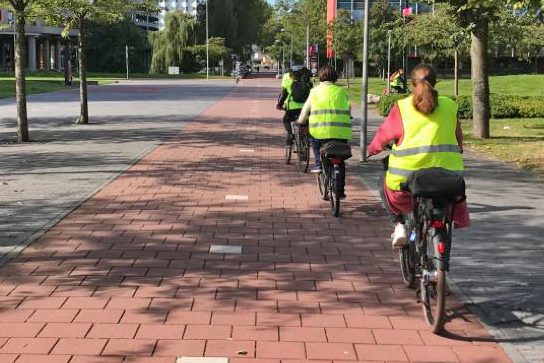
This is a common experience for many people who move to the Netherlands – that mixed feeling of wanting to join the cycling culture and being intimidated by the thousands of people cycling effortlessly and almost without thinking. It is why TU Delft Human Resources engaged Mobycon to help them deliver a Fietseducatie or Cycling Education Programme to help international staff and their partners adjust to their new Dutch life.
Creating a Welcoming Space
As an internationally recognized institution, TU Delft employs a large number of internationals coming from all corner of the globe. Of course the University wants to welcome these people as best they can and support them as they adapt to Dutch culture – of which cycling is an important part. However, after a few incidents, the idea was formed to create a programme to help bridge the cultural gap and create a safe and welcoming cycling environment.
Ingrid Halewijn, Human Resources director at TU Delft, initiated the workshop in 2017. As Fabiënne Scholte-Buijs, HR Advisor for the Coming to Delft Service, explains, “It is important for us to create a safe environment on campus for international employees of TU Delft, their spouses and visitors.” The resulting Cycling Education and Study Tour programme provides that welcoming space to learn about cycling in the Netherlands while also ensuring that they can cycle around the campus safely.
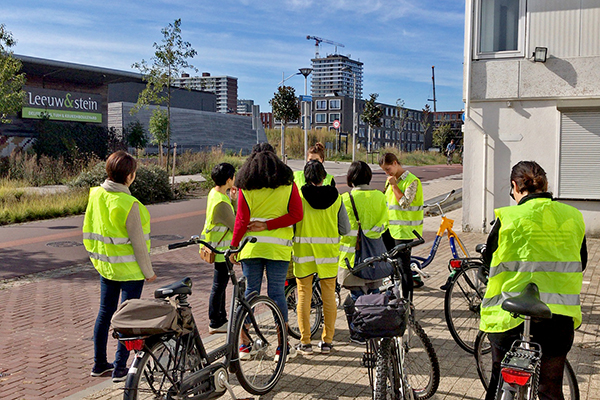
Learning from the experts, and each other
The program, initially launched by Angela van der Kloof, Senior Mobycon Consultant and experienced cycling educator, centres around the notion that people learn best in an environment that is free of judgement and assumptions. For the 2019 cycle, advisors Shelley Bontje and Sophie Simon took the mantle to continue Angela’s work and provide an interactive program aimed at participants not only learning from their instructors but also sharing their experiences and learn from each other. “It helps them realize they don’t need to be afraid or embarrassed to share their experiences,” says Shelley. “if you didn’t grow up in the Netherlands, you may encounter some situations that to a lot of Dutch people are very normal, but might not be normal for newcomers.”
Each session begins with an in-class portion presenting the history of the Dutch cycling culture, as well as more technical details like the equipment they should have, signage they will encounter on the streets, and the rules of the road for cycling. Before any of that, however, Shelley and Sophie ask the group a few simple but important questions:
- Why did you want to join this program?
- Have you already cycled in the Netherlands?
- Did you cycle in your home country?
- What questions do you hope to have answered?
While these questions help the team understand where their group is starting from, by hearing about other experiences or questions, it breaks down any barriers and shows the group that it is ok not to know everything. “I’m always happy when people have questions,” reveals Sophie. “It really shows that they are interested and you know what you are doing is really needed.” The programme is also constantly being tweaked to meet the participants at their level. For example, following earlier sessions in 2019, Sophie and Shelley realized that it would be helpful to go through how to navigate an intersection and right-of-way rules. “If you don’t have a drivers licence then you probably don’t know,” Sophie points out.
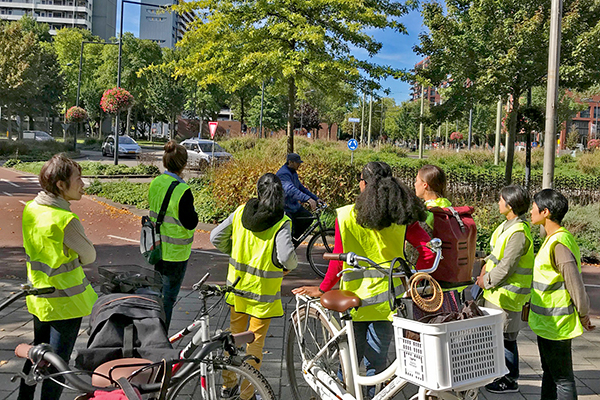
Real-life education
Following the lecture, the group then goes out on their bikes to put the theory they have just learned into action. They are led throughout Delft, stopping in a number of locations, to experience the real-life conditions. This includes some more high conflict points in order to teach them how to navigate them better. “Safety is of course important. We would like to avoid accidents and have participants feel confident on their bikes,” explains Fabiënne. By having this personal experience riding on the campus and around the city, they are helping create a safer mobility environment for all staff, students and visitors.
The participants usually get to experience a bicycle street, Delft’s major protected roundabout at Delflandplein, the central train station and the indoor parking facilities within the city centre. At the central station, Shelley and Sophie provide important details like how the bike parking works and how long you can park there. But Sophie notes they are always very interested to learn how to use the upper bike racks, which she completely understands. “When I arrived here last year from Luxembourg I was also scared to use it. So, it’s no surprise that they always ask us to show them how to use it.”
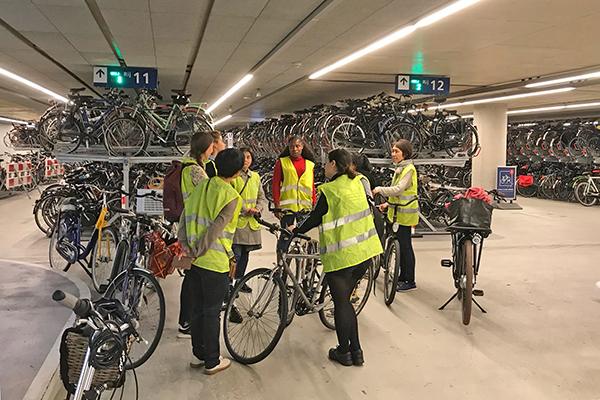
Shelley, born and raised in the Netherlands, thinks it’s a nice combination to have someone like Sophie providing her experiences as a non-native Dutch person. “It’s important to understand that most Dutch people also took time to learn but that mostly happen when you’re a child at school, with parents and taking the national bicycle exam,” she notes. “But it’s also important to share those outsider experiences because it shows compassion and understanding.”
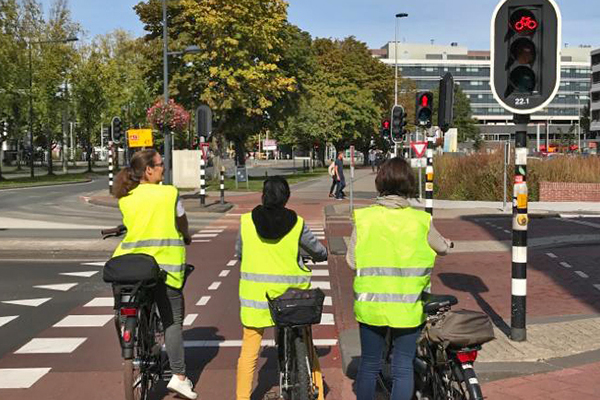
Understanding different perspectives
It’s that compassion and understanding that proved to help not just the participants but also Fabiënne see the value of the programme. After joining the lecture and tour at the most recent session in September, she experienced first-hand what many international visitors cycling in the Netherlands experience. “It was an eye-opener. Traffic situations that are normal for the Dutch can be very challenging for internationals, for instance roundabouts where you have traffic and public transportation coming from every side.” Through seeing what is like with new eyes she could recognize why many internationals may behave differently on the cycle tracks, and that more understanding should be practiced, something she later expressed on LinkedIn that day. Compassion goes a long way to helping newcomers become more comfortable in their new environment.
Continuing the learning
Because of the success of the programme, TU Delft is exploring the opportunity to continue offering it in 2020. In the meantime, with one session left for 2019, Shelley and Sophie are pleased to have the opportunity to coordinate this programme and look forward to meeting the next group on November 15th. Are you an international employee at TU Delft or a partner of someone who does and would like to participate? Find out more information about the program and how you can sign up here: http://bit.ly/36Az2qi
Can’t make the session? Visit TU Delft’s Cycling in the Netherlands information page for handy tips: http://bit.ly/2WJIx1T

